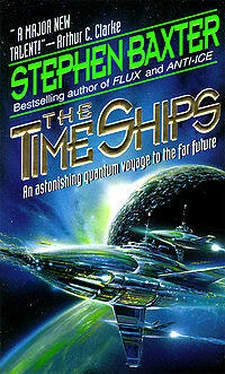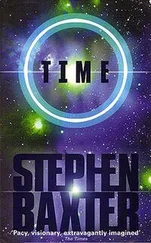And — it occurred to me — if Nebogipfel was right, perhaps I was not responsible for the wholesale destruction of Weena’s History after all. Perhaps, in some sense, that History still existed! I felt a little of my guilt and grief lift at the thought.
Now the smoking-room door clattered open, and in bustled Filby. It was not yet nine in the morning; Filby was unwashed and unshaven, and a battered dressing gown clung to his frame. He said to me: “There’s a visitor for you. That scientist chap from the Air Ministry Bond mentioned…”
I pushed back my chair and stood. Nebogipfel returned to his studies, and Moses looked up at me, his hair still tousled. I regarded him with some concern; I was beginning to realize that he was taking all this dislocation in time quite hard. “Look,” I said to him, “it seems I have to go to work. Why don’t you come with me? I’d appreciate your insights.”
He smiled without humor. “ My insights are your insights,” he said. “You don’t need me.”
“But I’d like your company… After all, this may be your future. Don’t you think you’ll be better off if you stir yourself a bit?
His eyes were deep, and I thought I recognized that longing for home which was so strong in me. “Not today. There will be time… perhaps tomorrow.” He nodded to me. “Be careful.”
I could think of no more to say — not then.
I let Filby lead me to the hall. The man waiting for me at the open front door was tall and ungainly, with a shock of rough, graying hair. A trooper stood in the street behind him.
When the tall chap saw me, he stepped forward with a boyish clumsiness incongruous in such a big man. He addressed me by name, and pumped my hand; he had strong, rather battered hands, and I realized that this was a practical experimenter — perhaps a man after my own heart! “I’m glad to meet you so glad,” he said. “I work on assignment to the DChronW that’s the Directorate of Chronic-Displacement Warfare, of the Air Ministry.” His nose was straight, his features thin, and his gaze, behind wire-rimmed spectacles, was frank. He was clearly a civilian, for, beneath the universal epaulets and gas-mask cache, he wore a plain, rather dowdy suit, with a striped tie and yellowing shirt beneath. He had a numbered badge on his lapel. He was perhaps fifty years old.
“I’m pleased,” I said. “Although I fear your face isn’t familiar…”
“Why on earth should it be? I was just eight years old when your prototype CDV departed for the future… I apologize! — that’s ’Chronic Displacement Vehicle.’ You may get the hang of all these acronyms of ours — or perhaps not! I never have; and they say Lord Beaverbrook himself struggles to remember all the Directorates under his Ministry.
“I’m not well-known — not nearly so famous as you! Until a while ago, I worked as nothing more grand than Assistant Chief Designer for the Vickers-Armstrong Company, in the Weybridge Bunker. When my proposals on Time Warfare began to get some notice, I was seconded to the headquarters of the DChronW, here at Imperial. Look,” he said seriously, “I really am so glad you’re here — it’s a remarkable chance that brought you. I believe that we — you and I — could forge a partnership that might change History — that might resolve this damned War forever!”
I could not help but shudder, for I had had my fill of changing History already. And this talk of Time Warfare — the thought of my machine, which had already done so much damage, deployed deliberately for destruction! The idea filled me with a deep dread, and I was unsure how to proceed.
“Now — where shall we talk?” he asked. “Would you like to retire to my room at Imperial? I have some papers which—”
“Later,” I said. “Look — this may seem odd to you — but I’m still newly arrived here, and I’d appreciate seeing a little more of your world. Is that possible?”
He brightened. “Of course! We can have our talk on the way.” He glanced over his shoulder at the soldier, who nodded his permission.
“Thank you,” I said, “Mr.—”
“Actually, it’s Dr. Wallis,” he said. “Barnes Wallis.”
Imperial College, it turned out, was situated in South Kensington — it was a few minutes’ walk from Queen’s Gate Terrace. The College had been founded a little after my time, in 1907, from three principal constituent colleges, with which I was familiar: they were the Royal College of Chemistry, the Royal School of Mines and the City and Guilds College. As it happened, in my younger days I had done a little teaching at the Normal School of Science, which had also been absorbed into Imperial; and, emerging now into South Kensington, I was reminded of how I had made the most of my time in London, with many visits to the delights of such establishments as the Empire, Leicester Square. At any rate, I had got to know the area well — but what a transformation I found now!
We walked out through Queen’s Gate Terrace towards the College, and then turned up Queen’s Gate to Kensington Gore, at the southern edge of Hyde Park. We were escorted by a half-dozen soldiers — quite discreet, for they moved about us in a rough circle — but I wondered at the size of the force that might be brought down on us if anything went awry. It did not take long before the sticky heat started to sap my strength — it was like being in a large, hot building — and I took off my jacket and loosened my tie. On Wallis’s advice, I clipped my heavy epaulets to my shirt, and reattached my gas-mask bag to my trouser-belt.
The streets were much transformed, and it struck me that not all the changes between my day and this had been for ill. The banishment of the insanitary horse, the smoke of domestic fires and the fumes of the motorcar — all for reasons of the quality of the air under the Dome — had resulted in a certain freshness about the place. In the major avenues, the roadway was surfaced over by a new, more resilient, glassy material, kept clean by a chain of workmen who pushed about trolley-carts fixed with brushes and sprinklers. The roads were crowded with bicycles, rickshaws and electrical trams, guided by wires which hissed and sparked blue flashes in the gloom; but there were new ways for pedestrians, called the Rows, which ran along the front of the houses at the height of the first storey — and on the second or even third storeys in some places. Bridges, light and airy, ran across the roads to join up these Rows at frequent intervals, giving London — even in this Stygian darkness — something of an Italian look.
Moses later saw a little more of the life of the city than I did, and he reported bustling shops in the West End — despite the privations of the War — and new theaters around Leicester Square, with frontages of reinforced porcelain, and the whole glowing with reflections and illuminated advertisements. But the plays performed were of a dull, educational or improving variety, Moses complained, with two theaters given over to nothing but a perpetual cycle of Shakespeare’s plays.
Wallis and I came past the Royal Albert Hall, which I have always regarded as a monstrosity — a pink hatbox! In the obscurity of the Dome, this pile was picked out by a row of brilliant light beams (projected by Aldis lamps, Wallis said), which made that memorable heap seem still more grotesque, as it sat and shone complacently. Then we cut into the Park at the Alexandra Gate, walked back to the Albert Memorial, and set off along the Lancaster Walk to the north. Ahead of us I could see the flickering of the Babble Machine beams against the Roof, and hear the distant boom of amplified voices.
Wallis kept up a descriptive chatter as we walked. He was good enough company, and I began to realize that he was indeed the sort of man who — in a different History — I might have called a friend.
Читать дальше
Конец ознакомительного отрывка
Купить книгу









